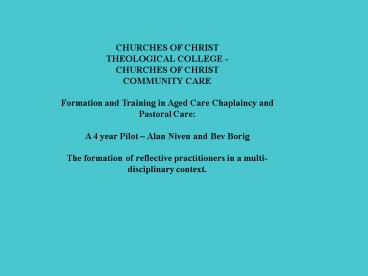CHURCHES OF CHRIST PowerPoint PPT Presentation
1 / 14
Title: CHURCHES OF CHRIST
1
CHURCHES OF CHRIST THEOLOGICAL COLLEGE -
CHURCHES OF CHRIST COMMUNITY CARE Formation
and Training in Aged Care Chaplaincy and Pastoral
Care A 4 year Pilot Alan Niven and Bev
Borig The formation of reflective practitioners
in a multi-disciplinary context.
2
1. HISTORY - A small denomination with an 80
year history in Aged Care Four facilities.
1999 2005. 3 Chaplains. All P/T 2006 2009
A small pilot cohort of 4 Student Chaplains.
2 days a week each. A commitment by the CEO and
Board of Churches of Christ Community Care
(CCCC) to a co-operative venture with the
Churches of Christ Theological College (CCTC) to
undertake the specialist formation of selected
students. A variation of the Teaching
Hospital model.
3
2. THE GOAL To develop a formation program that
embodies the minimum requirements of a
theological qualification (MCD) studied in
conjunction with - a 2 day a week placement
for 96 weeks (2 years) - under supervision
though a process of Supervised Theological
Field Education (VATFE accredited) - with
specialist and trained supervisors (and didactic
input) from within the sector with a mid-year
review based on KPIs -
4
2. THE GOAL (b) and an end of year Interview
Panel using (i) an end of year review (ii)
learning goals from mid-year review (iii)
Evaluation and Feedback Group data (iv)
supervisors report (v) self- assessment
- for those who are passionate about this area
of ministry and committed to ongoing specialist
formation.
5
3. CURRENT FORMATION PROGRAM Year One Year of
discernment. One day a week as a volunteer.
Experience. Theological Education. Admission
InterviewYears 2 3 2 days (16 hrs pw) for 48
weeks p.a. 4 semesters of STFE Year 4 Year of
Consolidation. Ongoing supervision.
6
4. MANAGING THE PILOT CCCC Bev Borig.
Chaplain Team Leader. CCTC Alan Niven,
Lecturer Pastoral Studies. Anne
Mallaby, Director, STFE. Chaplaincy Advisory
Group CEO ANBB2 chaplains Site
Managers Senior staff briefed and
committed to the project.
7
5. A NOTE ON SYSTEMIC CHANGES Location of
Chaplaincy on Organisational Charts. The
development of a Team approach and flexible
cross-facility coverage. Implementation of
more effective Ministry Appraisals for all
Chaplaincy Staff now managed within the
Chaplaincy Department and not by general
organisational processes. Character
(commitment to the field) Competency
Chemistry. Autonomy and trust (i)
Chaplaincy Advisory Group (ii) Board
representation (iii) Role of Site Managers
(iv) Integration with Strategic Plans for each
Facility.
8
6. WHY STFE AS THE MODEL OF SUPERVISION AND
FORMATION? Contextual, long-term integration
of practice and ministry formation Aged care
chaplaincy is concerned with community- building
and being a recognised, ongoing member of the
community. Continual reflection and
supervision over a minimum of 2 years enables
the culture, staff, politics and spirituality of
each site to be reflected upon in a developing
way. Ministry to staff, residents, family, and
volunteers challenges the Chaplain to be
engaged in ways that have cultural,
socio- political, systemic and justice-making
implications in addition to the normal patterns
of individual and community pastoral and
spiritual care.
9
6. WHY STFE AS THE MODEL OF SUPERVISION AND
FORMATION? (cont.) An Evaluation and Feedback
Group on site (Eg. Resident, relative,
volunteer, staff member etc.) offers monthly
feedback, discussion and reflection on actual
practice. It answers some of the question How
is the ministry of the student actually being
received by those they are ministering
with? A weekly peer reflection group at CCTC
offers a space for verbatim work, theological
reflections, occasional ministry specific input
(eg Privacy and Dignity by a Lifestyle
Co-Ordinator Transitional Rituals by a
Chaplain), and peer support/debriefing under
the guidance of the Director of STFE.
10
6. WHY STFE AS THE MODEL OF SUPERVISION AND
FORMATION? (cont.) Monthly supervision
sessions. Accredited with VATFE, paid by
CCTC. Long-term, ongoing integration with 2-4
years of biblical, theological and pastoral
study. Note CPE is a valuable adjunct to be
undertaken at some stage but not concurrently
with STFE.
11
7. THE PROCESS OF DISCERNMENT 4 YEAR Year
One Experience on site as a volunteer 1
day. Informal supervision. Ongoing
theological education. Interview panel and
admission to formation as Student Aged Care
Chaplain Years 2 and 3. STFE. Supervision. Peer
group. Feedback Group. 2 days per
week. Ongoing theological education. Mid-year
(with supervisor) and end of year review (panel
interviews)
12
7. THE 4 YEAR PROCESS OF DISCERNMENT(cont.) Year
4 Consolidation through peer reflection and
supervision Usually completing theological
study Final interview panel.
13
8. INTEGRATION OF PASTORAL STUDIES PROGRAMME
AT CCTC 1. It is assumed that students will be
concurrently studying biblical and theological
units as core dimensions of any MCD award and
will undertake at least 2 years of placement
and reflective practice. 2. PARTNERSHIPS Discuss
ions are in place with Revd Dr Laurie McNamara
CM (Adelaide College of Divinity, formerly at
the Catholic Institute of Sydney) re a
Certificate 4 Pastoral Care with Ageing
Persons. This covers volunteers and may lead
people into a tertiary track.
14
INTEGRATION OF PASTORAL STUDIES PROGRAMME AT CCTC
(cont.) For advanced learning after the CCTC
programme Alan has been involved in the
Review of CENTRE FOR AGEING AND PASTORAL
STUDIES CANBERRA. (Charles Sturt University).
See below for course details. - Grad.
Certificate in Ageing and Pastoral Studies -
Grad. Diploma of Ageing and Pastoral Studies -
Master of Arts (Ageing and Pastoral Studies)

